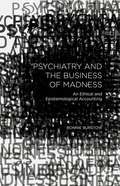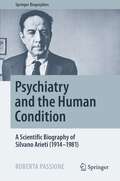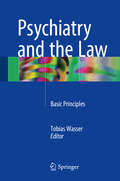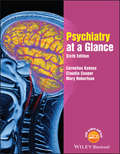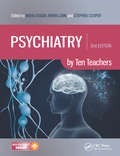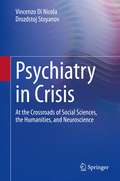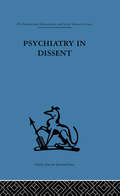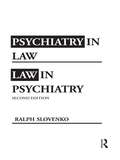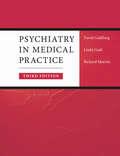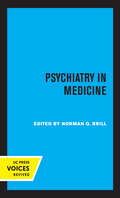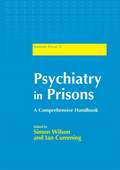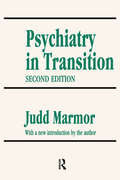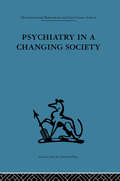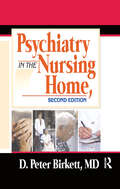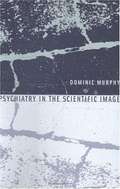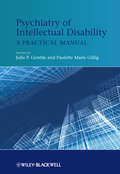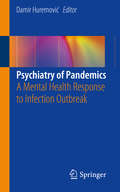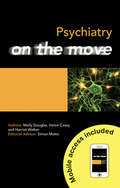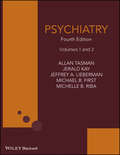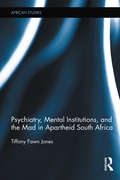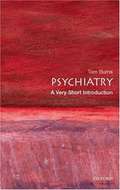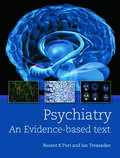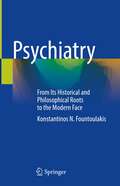- Table View
- List View
Psychiatry and the Business of Madness
by Bonnie BurstowPsychiatry and the Business of Madness deconstructs psychiatric discourse and practice, exposes the self-interest at the core of the psychiatric/psychopharmacological enterprise, and demonstrates that psychiatry is epistemologically and ethically irredeemable. Burstow's medical and historical research and in-depth interviews demonstrate that the paradigm is untenable, that psychiatry is pseudo-medicine, that the "treatments" do not "correct" disorders but cause them. Burstow fundamentally challenges our right to incarcerate or otherwise subdue those we find distressing. She invites the reader to rethink how society addresses these problems, and gives concrete suggestions for societal transformation, with "services" grounded in the community. A compelling piece of scholarship, impeccable in its logic, unwavering in its moral commitment, and revolutionary in its implications.
Psychiatry and the Human Condition: A Scientific Biography of Silvano Arieti (1914–1981) (Springer Biographies)
by Roberta PassioneThis book is the result of extensive archival research conducted on the Collection “Silvano Arieti Papers” held in the Manuscript Division of the Library of Congress, Washington, D.C. It offers readers the first scientific biography of the renowned Italian-born psychiatrist Silvano Arieti, who in 1939 emigrated to the United States, where he gained fame and recognition for his work on schizophrenia. In 1975, the second edition of his book, Interpretation of Schizophrenia, received the National Book Award in Science. The book has been cast as a twofold journey: an exploration of the life of a psychiatrist and scientist and an overview of twentieth century psychiatry and its significant issues, debates, and transformations. Readers will find useful insights for a better understanding of psychiatry as a discipline capable of portraying the complexity of human nature.
Psychiatry and the Law
by Tobias WasserThis book is specifically designed for new psychiatrists and all other medical professionals who lack the training necessary to confront the complicated legal and ethical issues that arise at the intersection of the mental health and judicial systems. Written by experts in the field, each chapter begins with a challenging case vignette synthesized from a historical legal case that places the reader in the role of the treatment provider. The text presents details of the legal case, historical significance, and the precedent it set before discussing the core principles of that particular subject area. Each chapter reviews the existing literature and reinforces the most salient points. Topics include risk assessment, substance misuse and the law, legal issues within child and adolescent psychiatry, involuntary medication considerations, and other challenges that are often not sufficiently addressed in training. The text is specifically designed for new psychiatrists and other professionals who are transitioning from their studies into clinical practice, concisely explaining and defining the issues in a practical, reader-friendly tone suitable as both a quick-reference in a busy environment or as a resource for private study. Psychiatry and the Law: Basic Principles is an excellent resource for new psychiatrists, psychologists, social workers, students, and other professionals accommodating medical and legal boundaries in clinical practice.
Psychiatry and the Law: Basic Principles
by Tobias Wasser Rocksheng ZhongThis book is designed to help new psychiatrists and other medical professionals confront the complicated legal and ethical issues that arise at the intersection of the mental health and judicial systems. The law provides the boundaries in which clinical care operates. Appreciating these boundaries is particularly important when working with individuals whose rights may already be curtailed (forensic settings, for example). Understanding how psychiatry and the law interface provides students and trainees with a foundation for building their skills and attitudes through training and beyond. This text can guide or supplement education on the legal regulation of psychiatry, the use of psychiatry to answer legal questions, and the treatment of individuals with criminal justice involvement.In the second edition of this text, the editors have updated several chapters with new information and added chapters covering topics not addressed in the first edition. Each chapter begins witha clinical case vignette that brings the topic to life through a clinical encounter, the majority of which are based on landmark legal cases that set a historical precedent. The text presents details of the legal case, historical significance, and the precedent it set before discussing the core principles of the subject area. Each chapter reviews the existing literature and reinforces the most salient points. Topics include risk assessment, substance misuse and the law, legal issues within child and adolescent psychiatry, involuntary medication considerations, and other challenges that are often not sufficiently addressed in training.Psychiatry and the Law: Basic Principles covers a wide range of topics that would be suitable for use as the basis of a course in forensic psychiatry for psychiatry residents and is an excellent resource for new psychiatrists, psychologists, social workers, students, and other professionals navigating medical and legal boundaries in clinicalpractice.
Psychiatry at a Glance
by Claudia Cooper Cornelius Katona Mary RobertsonPsychiatry at a Glance is an easy-to-use, accessible introductory and study text for all students of psychiatry. It helps develop your skills in history taking and performing the Mental State Examination (MSE), and presents 'need to know' information on the basic science, treatment, and management of the major disorders.This edition features:Thoroughly updated and reorganised artwork, offering greater clarity and easier understanding for those new to the subjectGreater emphasis on history taking and examination - essential for clinical work and clerking patientsNew chapters on mental health capacity and coverage of the Australian and New Zealand health care legislationEven more Extended Matching Questions, brand new Single Best Answer Questions, and sample OSCE stations so you can test your knowledgeA brand new companion website at www.ataglanceseries.com/psychiatry, featuring updated case studies and downloadable illustrations.Psychiatry at a Glance is the ideal companion for anyone about to start a psychiatric attachment or module and will appeal to medical students, junior doctors and Psychiatry trainees as well as nursing students and other health professionals.
Psychiatry by Ten Teachers (Second Edition)
by Stephen Cooper Nisha Dogra Brian LunnPsychiatry by Ten Teachers follows the highly-praised and successful ‘Ten Teachers’ tradition of providing the key information in a chosen specialty as required by the medical undergraduate, junior doctor and trainee GP, written by ten respected experts in the field. With medical students closely involved in the text’s development from the outset the text focuses on what the medical student and junior really need to know, with a clear rationale for the inclusion of every topic discussed at a level appropriate for the inexperienced, and will be of value to their future career whatever field they ultimately decide to specialize in. Completely up to date, this revised second edition encourages students and recently qualified doctors to get the most out of their psychiatry and community attachments, without overwhelming them with unnecessary detail. In line with the core curriculum recommended by the Royal College of Psychiatry, useful tips and advice ensure this is much more than a standard introduction to the subject, encouraging additional reading, supporting critical thinking and bringing exam success.
Psychiatry in Crisis: At the Crossroads of Social Sciences, the Humanities, and Neuroscience
by Vincenzo Di Nicola Drozdstoj StoyanovThe field of academic psychiatry is in crisis, everywhere. It is not merely a health crisis of resource scarcity or distribution, competing claims and practice models, or level of development from one country to another, but a deeper, more fundamental crisis about the very definition and the theoretical basis of psychiatry. The kinds of questions that represent this crisis include whether psychiatry is a social science (like psychology or anthropology), whether it is better understood as part of the humanities (like philosophy, history, and literature), or if the future of psychiatry is best assured as a branch of medicine (based on genetics and neuroscience)? In fact, the question often debated since the beginning of modern psychiatry concerns the biomedical model so that part of psychiatry’s perpetual self-questioning is to what extent it is or is not a branch of medicine. This unique and bold volume offers a representative and critical survey of the history of modern psychiatry with deeply informed transdisciplinary readings of the literature and practices of the field by two professors of psychiatry who are active in practice and engaged in research and have dual training in scientific psychiatry and philosophy. In alternating chapters presenting contrasting arguments for the future of psychiatry, the two authors conclude with a dialogue between them to flesh out the theoretical, research, and practical implications of psychiatry’s current crisis, outlining areas of divergence, consensus, and fruitful collaborations to revision psychiatry today. The volume is scrupulously documented but written in accessible language with capsule summaries of key areas of theory, research, and practice for the student and practitioner alike in the social and human sciences and in medicine, psychiatry, and the neurosciences.
Psychiatry in Dissent: Controversial issues in thought and practice second edition
by Anthony ClareTavistock Press was established as a co-operative venture between the Tavistock Institute and Routledge & Kegan Paul (RKP) in the 1950s to produce a series of major contributions across the social sciences. This volume is part of a 2001 reissue of a selection of those important works which have since gone out of print, or are difficult to locate. Published by Routledge, 112 volumes in total are being brought together under the name The International Behavioural and Social Sciences Library: Classics from the Tavistock Press. Reproduced here in facsimile, this volume was originally published in 1980 and is available individually. The collection is also available in a number of themed mini-sets of between 5 and 13 volumes, or as a complete collection.
Psychiatry in Law / Law in Psychiatry, Second Edition
by Ralph SlovenkoPsychiatry in Law/Law in Psychiatry, 2nd Edition, is a sweeping, up-to-date examination of the infiltration of psychiatry into law and the growing intervention of law into psychiatry. Unmatched in breadth and coverage, and thoroughly updated from the first edition, this comprehensive text and reference is an essential resource for psychiatry residents, law students, and practitioners alike.
Psychiatry in Medical Practice
by Linda Gask Prof David Goldberg Richard MorrissThis fully updated third edition of Psychiatry in Medical Practice takes into account major changes in medical education since 1994. New sections provide information on problem-based learning and observed structured clinical examinations. Divided into four sections, this book covers: clinical approaches to the patient syndromes of disorder disorders related to stages of the life cycle services, ethics and the law. As well as retaining the key features of the previous editions, this book includes two brand new chapters on risk assessment and the Mental Health Service. A handy portable reference card is also included; this has been updated to incorporate a scale for assessing cerebral impairment in the elderly, and a new assessment of suicidal risk scale. This highly practical book is an essential guide for all medical students and doctors in training who are involved with psychiatry. It is also a useful reference tool for those who are more experienced in the field.
Psychiatry in Medicine
by Norman Q. BrillThis title is part of UC Press's Voices Revived program, which commemorates University of California Press’s mission to seek out and cultivate the brightest minds and give them voice, reach, and impact. Drawing on a backlist dating to 1893, Voices Revived makes high-quality, peer-reviewed scholarship accessible once again using print-on-demand technology. This title was originally published in 1962.
Psychiatry in Transition
by Judd MarmorWhen the first edition of Psychiatry in Transition came out, Dr. Gene Usdin wrote that "to read Marmor's papers is to read not only psychiatric history, but also where that history will be in the next decade." That next decade has happened, and Marmor's papers remain a beacon of professional endeavor. This second edition includes a final chapter on "Short-Term Dynamic Psychotherapy," in which the historical background of brief psychotherapy, focusing on the contributions of Freud, Ferenczi, Rand, and Alexander, is examined and synthesized. Throughout, certain basic themes stand out. First is the necessity for building upon a solid foundation of scientific thought, coupled with a readiness to change theories that do not fit with established facts. Second, Marmor offers a systems theory to replace simplistic, unitary, or linear theories. Third, he presents some common denominators for illuminating the divergent views that characterize contemporary psychiatric theory and practice. The whole is linked by a deep concern with betterment of the human predicament. Marmor demonstrates that causation in psychiatry can be optimally understood in terms of multiple interacting variables rather than as a response to unitary factors. He foreshadows and predicts developments that are now current in contemporary psychiatric practice, such as the relationship between neurochemistry and behavior, and group therapy with dynamic psychotherapy. He also deals with the importance of cultural and socioeconomic factors in individual personality development. The work concludes with a series of chapters on interethnic hostility, nationalism, and urban violence. Marmor's work clarifies the nature of the psychoanalytic process by liberating it from obscurantism and jargon. This book points the way toward unraveling some of the cognitive dissonance in this area. As Leon Eisenberg observed, this is "an admirable vade mecum of dynamic psychiatry both for residents in training and clinicians in practice."
Psychiatry in a Changing Society
by S H Foulkes G Stewart PrinceTavistock Press was established as a co-operative venture between the Tavistock Institute and Routledge & Kegan Paul (RKP) in the 1950s to produce a series of major contributions across the social sciences. This volume is part of a 2001 reissue of a selection of those important works which have since gone out of print, or are difficult to locate. Published by Routledge, 112 volumes in total are being brought together under the name The International Behavioural and Social Sciences Library: Classics from the Tavistock Press. Reproduced here in facsimile, this volume was originally published in 1969 and is available individually. The collection is also available in a number of themed mini-sets of between 5 and 13 volumes, or as a complete collection.
Psychiatry in the Nursing Home: Assessment, Evaluation, And Intervention
by D. Peter BirkettGet the vital clinical information you need with this comprehensive handbook!In the decade since the first edition of this book, dramatic changes have taken place in the field of geriatric psychiatry. Psychiatry in the Nursing Home, Second Edition, presents timely information on the newest trends in law, culture, and medications, while still offering essential advice on the fundamental concerns of caring for elderly patients with mental illnesses. The new edition of this essential handbook presents up-to-date information on psychiatric issues involving nursing home patients. Featuring helpful case histories and diagnostic criteria, Psychiatry in the Nursing Home, Second Edition, helps you effectively treat such difficult problems as noisy patients, sexual acting out, and incontinence. In addition, it offers help with such administrative concerns as financial issues, absent or warring families, and staffing problems. Psychiatry in the Nursing Home, Second Edition, presents incisive discussions of the changes in the field since the publication of the first edition, including: the effects of the new Prospective Payment System the use of newly released psychotropic medications the altered nomenclature of the DSM-IV the rise in assisted-living facilities the rapid development of the specialty of geriatric psychiatry With its comprehensive scope and practical advice, Psychiatry in the Nursing Home, Second Edition, is a must-have for nursing-home administrators and staff. Policymakers, mental health professionals, and geriatricians will be fascinated by the book&’s wider considerations of the problems of housing and caring for the mentally ill and its provocative suggestions for future policy.
Psychiatry in the Scientific Image
by Dominic MurphyIn "Psychiatry in the Scientific Image," Dominic Murphy looks at psychiatry from the viewpoint of analytic philosophy of science, considering three issues: how we should conceive of, classify, and explain mental illness.
Psychiatry of Intellectual Disability
by Julie P. Gentile Paulette Marie GilligPatients with intellectual disability (ID) can benefit from the full range of mental health services. To ensure that psychiatric assessment, diagnosis and treatment interventions are relevant and effective; individuals with ID should be evaluated and treated within the context of their developmental framework. Behavior should be viewed as a form of communication.Individuals with ID often present with behavioral symptoms complicated by limited expressive language skills and undiagnosed medical conditions. Many training programs do not include focused study of individuals with ID, despite the fact that patients with ID will be seen by virtually every mental health practitioner. In this book, the authors present a framework for competent assessment and treatment of psychiatric disorders in individuals with ID.Psychiatry of Intellectual Disability is a resource guide for psychiatrists, nurse practitioners, and other prescribers treating patients with ID. It is a supplemental text for psychiatry residents, medical students, psychology graduate students, psychotherapists, counselors, social workers, behavior support specialists and nurses. To assist the practicing clinician the book includes:Clinical vignettesClinical pearlsCharts for quick referenceIssues concerning medications and poly-pharmacyAltered diagnostic criteria specific for use with individuals with IDThere are no evidence-based principles dedicated to psychotropic medication use in ID, but consensus guidelines address the high prevalence of poly-pharmacy. Altered diagnostic criteria have been published which accommodate less self-report and incorporate collateral information; this book reviews the literature on psychotropic medications, consensus guidelines, and population-specific diagnostic criteria sets.Psychiatry of Intellectual Disability also includes:Interviewing techniques and assessment tips for all levels of communicative ability as well as for nonverbal individualsAssessment of aggression to determine etiology and formulate a treatment planOverview of types of psychotherapy and suggested alterations for each to increase efficacyRelevant legal issues for caregivers and treatment providersThe detective work involved in mental health assessment of individuals with ID is challenging yet rewarding. The highest quality mental health treatment limits hospital days, improves quality of life and often allows individuals to live in the least restrictive environments. Psychiatry of Intellectual Disability is a must have resource for clinicians treating the ID population.
Psychiatry of Pandemics: A Mental Health Response to Infection Outbreak
by Damir HuremovićThis book focuses on how to formulate a mental health response with respect to the unique elements of pandemic outbreaks. Unlike other disaster psychiatry books that isolate aspects of an emergency, this book unifies the clinical aspects of disaster and psychosomatic psychiatry with infectious disease responses at the various levels, making it an excellent resource for tackling each stage of a crisis quickly and thoroughly. The book begins by contextualizing the issues with a historical and infectious disease overview of pandemics ranging from the Spanish flu of 1918, the HIV epidemic, Ebola, Zika, and many other outbreaks. The text acknowledges the new infectious disease challenges presented by climate changes and considers how to implement systems to prepare for these issues from an infection and social psyche perspective. The text then delves into the mental health aspects of these crises, including community and cultural responses, emotional epidemiology, and mental health concerns in the aftermath of a disaster. Finally, the text considers medical responses to situation-specific trauma, including quarantine and isolation-associated trauma, the mental health aspects of immunization and vaccination, survivor mental health, and support for healthcare personnel, thereby providing guidance for some of the most alarming trends facing the medical community.Written by experts in the field, Psychiatry of Pandemics is an excellent resource for infectious disease specialists, psychiatrists, psychologists, immunologists, hospitalists, public health officials, nurses, and medical professionals who may work patients in an infectious disease outbreak.
Psychiatry on the Move (Medicine on the Move)
by Molly Douglas Harriet Walker Helen CaseyThe Medicine on the Move series provides fully flexible access to subjects across the curriculum in a unique combination of print and mobile formats ideal for the busy medical student and junior doctor. No matter what your learning style-whether you are studying a subject for the first time or revisiting it during exam preparation, Medicine on the
Psychiatry, 2 Volume Set: Self-assessment And Review (National Medical Ser.)
by Michael B. First Jeffrey A. Lieberman Allan Tasman Michelle Riba Jerald KayNow in a new Fourth Edition, Psychiatry remains the leading reference on all aspects of the current practice and latest developments in psychiatry.From an international team of recognised expert editors and contributors, Psychiatry provides a truly comprehensive overview of the entire field of psychiatry in 132 chapters across two volumes. It includes two new sections, on psychosomatic medicine and collaborative care, and on emergency psychiatry, and compares Diagnostic and Statistical Manual (DSM-5) and International Classification of Diseases (ICD10) classifications for every psychiatric disorder.Psychiatry, Fourth Edition is an essential reference for psychiatrists in clinical practice and clinical research, residents in training, and for all those involved in the treatment psychiatric disorders.
Psychiatry, Mental Institutions, and the Mad in Apartheid South Africa (African Studies)
by Tiffany Fawn JonesIn the late 1970s, South African mental institutions were plagued with scandals about human rights abuse, and psychiatric practitioners were accused of being agents of the apartheid state. Between 1939 and 1994, some psychiatric practitioners supported the mandate of the racist and heteropatriarchal government and most mental patients were treated abysmally. However, unlike studies worldwide that show that women, homosexuals and minorities were institutionalized in far higher numbers than heterosexual men, Psychiatry, Mental Institutions and the Mad in Apartheid South Africa reveals how in South Africa, per capita, white heterosexual males made up the majority of patients in state institutions. The book therefore challenges the monolithic and omnipotent view of the apartheid government and its mental health policy. While not contesting the belief that human rights abuses occurred within South Africa’s mental health system, Tiffany Fawn Jones argues that the disparity among practitioners and the fluidity of their beliefs, along with the disjointed mental health infrastructure, diffused state control. More importantly, the book shows how patients were also, to a limited extent, able to challenge the constraints of their institutionalization. This volume places the discussions of South Africa’s mental institutions in an international context, highlighting the role that international organizations, such as the Church of Scientology, and political events such as the gay rights movement and the Cold War also played in shaping mental health policy in South Africa.
Psychiatry: A Very Short Introduction
by Tom BurnsPsychiatry is increasingly a part of everyday life. The growing number of patients being diagnosed with depression, ADD, alcoholism, and other illnesses mean that few people are not touched by it. This book provides a valuable and comprehensible introduction to the subject. It starts with the history of its development as a scientific field, including the identification of major mental illnesses, the rise and fall of the asylum system, and the flourishing of psychoanalysis and other psychotherapies. More than any other branch of medicine, psychiatry has been attacked and criticized. There is a long list of perceived horrors--patient abuse, bizarre medical experiments, mind-control by evil governments, coercion by maniacal hypnotists. Modern psychiatry brings with it new controversies, such as the perceived over-prescription of antidepressants and behavior modifiers for children and teens, or unchecked marketing power of drug companies. This book does not draw conclusions on these issues, but rather provides the reader with a clear understanding of what psychiatry is, and what it does, so that they can draw their own. It is a great reference for anyone with an interest in mental illness and its treatment, students of psychiatry, medicine, psychology, and history of science, and health professionals.
Psychiatry: An evidence-based text
by Bassant Puri Ian TreasadenSuccinct, user-friendly, thoroughly referenced and prepared by leading experts in the field, this book is the only single textbook you will need to succeed in the Royal College of Psychiatrists' MRCPsych and other related higher examinations. Chapters follow the structure and syllabus of the examination ensuring that you receive the necessary essen
Psychiatry: From Its Historical and Philosophical Roots to the Modern Face
by Konstantinos N. FountoulakisThis book was the end product of life experiences, thoughts and intellectual wanderings of the author, who through his career and for the last twenty years was always serving all the three aspects of a Psychiatrist: He is a clinician, a researcher and an academic teacher. The book includes a comprehensive history of Psychiatry since antiquity and until today, with an emphasis not only on main events but also specifically and with much detail and explanations, on the chain of events that led to a particular development. At the center of this work is the question ‘What is mental illness?’ and ‘Does free will exist?’. These are questions which tantalize Psychiatrists, neuroscientists, psychologists, philosophers, patients and their families and the sensitive and educated lay persons alike. Thus, the book includes a comprehensive review and systematic elaboration on the definition and the concept of mental illness, a detailed discussion on the issue of free will as well as the state of the art of contemporary Psychiatry and the socio-political currents it has provoked.Finally the book includes a description of the academic, social and professional status of Psychiatry and Psychiatrists and a view of future needs and possible developments. A last moment addition was the chapter on conspiracy theories, as a consequence of the experience with the social media and the public response to the COVID-19 outbreak which coincided with the final stage of the preparation of the book. Their study is an excellent opportunity to dig deep into the relation among human psychology, mental health, the society and politics and to swim in intellectually dangerous waters.
Psychische Erkrankungen als gesellschaftliche Aufgabe: Interdisziplinäre Perspektiven auf aktuelle Herausforderungen (Schriften zu Gesundheit und Gesellschaft - Studies on Health and Society #5)
by Christiane Woopen Carolin Schwegler Pauline MantellPsychische Erkrankungen sind eine gesamtgesellschaftliche Herausforderung mit vielen Facetten und müssen als solche auch interdisziplinär betrachtet werden. Der vorliegende Sammelband setzt genau hier an und hat das Ziel, ein differenziertes Bild über die Bedeutung psychischer Erkrankungen und den gesellschaftlichen Umgang mit ihnen zu zeichnen. Die vielfältigen Fragen, die sich dabei stellen, werden durch Vertreter*innen aus den Gesundheits-, Sozial- und Geisteswissenschaften erörtert. Dies beinhaltet theoretische sowie praktische Perspektiven mit historischen, aktuellen und zukunftsperspektivischen Schwerpunkten, die sich insgesamt dem Ziel widmen, aktuelle Herausforderungen aufzuzeigen und einen Beitrag zur Verbesserung der psychischen Gesundheitsversorgung in den Bereichen der Krankheitsbehandlung, Prävention und Gesundheitsförderung zu leisten.
